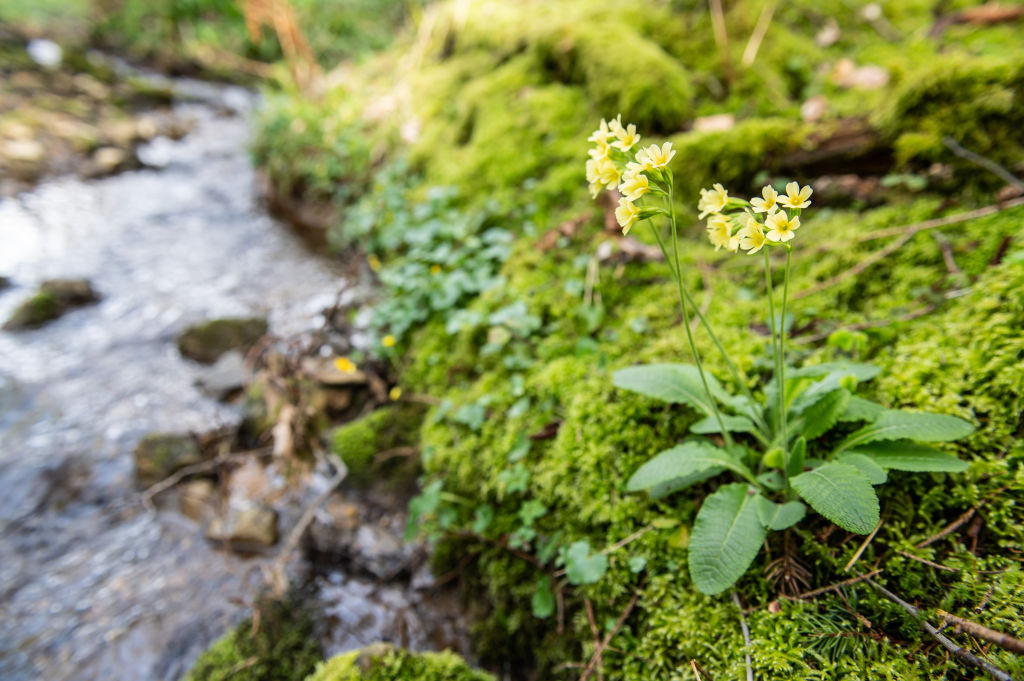My idle associations with dying—the smell of decay, the proverbial light going out, the coroner’s office, corpses in the sewers under Las Vegas, Halloween, my grandfather’s last, unpleasant, frustrating months confined to a bed—had nowhere to go when I first started learning about Earth, a Washington-based company that recently opened their second human composting facility here in Las Vegas. Visiting their website, I felt like I’d stumbled across a standard conservation group, or maybe a slightly pretentious yoga studio. There were pleasant, neutral-colored serif fonts, a looping video of moss and trees and sunlight breaking through a forest canopy and people happily trudging through the undergrowth in slow motion. The vibe isn’t death so much as what death might yield: greenery, abundance, a new purpose. Earth, a name I continue to smile at, provides what they prefer to call “transformations”: a human body is “gently” turned into soil via a proprietary machine, which accelerates the decomposition process by monitoring and manipulating the climate conditions inside.
To illustrate the simplicity and non-invasive nature of Earth’s procedure, the company provides an easy-to-read graphic whose brevity borders on condescension. First, the freshly-washed body is placed in a biodegradable shroud. Then the body is placed in the vessel, which is lined with a blend of organic mulch, wildflowers, and woodchips. Over the course of anywhere from 30 to 45 days, the body is then broken down on a molecular level, the temperature inside the vessel reaching as high as 131 degrees. Both temperature and moisture content are monitored to ensure the decomposition, and elimination of pathogens, is complete. At the end, the mulch combined with the body’s decomposed matter yields around 300 pounds of compost. Up to five quarts of compost are returned to the family. The remainder is carted off to one of Earth’s two conservation lands in the Olympic Peninsula in Washington or the Sierra Foothills in California. All of this sounds fairly straightforward, which is the point.
There are key terms used, and avoided. Bodies, not corpses, are handled. The machine involved is called a vessel. Bodies are received into the company’s care, like patients convalescing at a recovery facility. Nutrients are returned. Choice is key. Earth’s corporate language is cautious, affirming, and neutral. There is no religious dimension to their work. There is no soul to be shepherded. Such concerns are left to the families. Instead, Earth conducts itself with the kind of proud yet understated professionalism one would expect to encounter when buying an expensive piece of jewelry.
In person, the vessel, a product of years of R&D, the pride of Earth, looks like a fashionably repurposed iron lung, a rounded 8-foot tube painted a matte seafoam green. When I walked into the Earth lobby in Vegas, an employee in the main meeting room was sitting right next to a decommissioned vessel. Fleetingly, I wondered if there was a body in there, which would have made no sense. The Earth lobby felt like most any brand new building, a benign dentist’s office with bright overhead lighting and off-white furniture. On the walls, framed pictures of stereotypically healthy natural environments, lush forests and rich, dark soil, hands rummaging through the dirt, flowers and wet leaves, a climate utopia envisioning spring as the only season. Scattered around the space, including the small main area with two couches, a front desk, and the room with the model vessel, were several potted plants, living decor that also served as advertisements of a kind, a preview of what use you might be put to.
This question of use is one of the main pillars of the human composting philosophy. In the summer of 2019, the rapid soil transformation process, framed as an alternative to traditional burial or cremation, was legalized in the U.S. thanks to the lobbying of Katrina Spade, the founder of Recompose, the country’s first human composting facility, based in Seattle. Most people considering human composting have the environment in mind.
Indeed, as opposed to being buried in a casket or burned, human composting is focused entirely on the renewed potential of the product at the end. Recompose claims that for every body that goes through soil transformation, one metric ton of carbon dioxide is prevented from entering the atmosphere. Similarly mindful, Earth stresses the polluting effects of cremation, which produces emissions equal to a 600 mile car ride. The front of their brochure reads, “Leave the earth with beauty.”
I did my best not to sound cynical while talking to Kevin Matthes, Earth’s supervising care advisor for the West Coast. Broadly speaking, Earth’s process doesn’t bother me. In thinking about what my own ideal burial might look like, I settled on something like the slow version of what Earth and Recompose offer: burial in a simple shroud, allowed to decay at nature’s pace. That kind of harmonious, life-giving vision of death is hard to hold onto while actively engaging with Earth’s marketing materials, which boast that the founders have built “some of the most successful funeral brands in the United States.”
Matthes assured me that Earth was happy to partner with the country’s largest funeral services insurance provider, but I couldn’t help dwelling on the bureaucracy of death. Earth’s future ambitions—Matthes often spoke of “scaling” the company—sound difficult to distinguish from other corporate endeavors that utilize an environmentally-conscious veneer. They seem to favor quantity and a measured but frictionless quality.
Earth may have new ideas, ones that I may even find personally compelling, on how to shepherd the dead, but their goal is no different from any other company looking to carve out market share in the artificially constructed and highly mediated death care industry. Earth and Recompose aim to succeed not just by offering an alternative to burial, but a way to alleviate a lifetime of carbon sin. In a 2021 piece for Harper’s, writer Lisa Wells wrote of human composting, “The main appeal of this new method of disposition—which is, in a way, the oldest on earth—is the opportunity to assuage our guilt and anxiety about the ecological cost of our lives. A process through which mortal fear, both for one’s own fate and the fate of the planet, might be sublimated in a single act.”
When I asked Matthes how much participation families might have when going through this process, he demurred. For instance, what if a deceased’s loved ones wanted to hold a small ceremony in the room where the vessels are stored? I offered that maybe they could all close the door as a final act of farewell before receiving their loved one’s reconstituted remains at the end of those 45 days. Recompose offers an even more elaborate version of this option, as part of their “laying in” ceremony. Not only can families view the body, they can also participate in covering the deceased in the organic material used during the composting process and move the body into the vessel. Matthes said that unfortunately, due to the nature of the facility housing the vessels, such an option wasn’t feasible.
Just like any other startup looking to gain a foothold in a crowded market, a big part of Earth’s pitch is based on increased speed and efficiency. Whereas Recompose’s process takes between eight and 12 weeks, Earth promises a completion window between 30 and 45 days. When I asked Matthes why that number seemed to fluctuate depending on where I looked, he said that “closure” was a complicating factor for some families, and that Earth’s superior efficiency in the composting process would ensure families got that closure sooner. He then told me that Earth was trying to get the whole process cut down to 20 days.
Over the phone, I spoke to Tom Harries, one of the founders of Earth. Harries’s self-professed origin story in the death care industry begins with the death of his grandfather. Harries started two businesses, a digital funeral arrangement start-up and an online direct cremation service, both since acquired by other companies, before the concept of human composting caught his eye. His framing of the problem of capacity was one of pragmatism. “There’s going to be 50 million deaths in the United States in the next 10 years. If we’re not scaling properly, we’re not meeting the climate issue that poses,” he said.
I compared my experience at Earth with a friend, who has training as a death doula and also recently toured the company’s Vegas facility. “I like the idea of being turned into a tree,” they said. They also noted that, in their death doula classes, there was an emphasis on both the individual emotional and psychic experience of the person dying, and the communal grieving process of the family.
By contrast, there isn’t much reverence to be found in Earth’s focus on efficiency and scale. Matthes echoed a goal Harries told me: Earth plans to cover 80 percent of the United States in the next three to five years, with a facility no more than a three-hour drive away. It’s an ambitious growth model that bets on the broad appeal of human composting not just as a funerary alternative, but as a lucrative business.
Leaving Earth’s overly air-conditioned meeting room, I carried the impression that the net good of soil transformation belied its seemingly inescapable capitalist underpinnings, that what the company was really doing was seizing a sound business opportunity. All well and good, I suppose, given that the existing death care industry already burdens grieving families with emotional and financial anxiety. But a smoother, more efficient, and more environmentally conscious method for disposing of the dead doesn’t substitute for meaningful interaction, for a tactile, unmediated experience. It’s important to have companies like Earth around, but maybe not for the reasons they espouse. Rather, for the reminder that no matter what shape it takes, a company does not have a soul.






